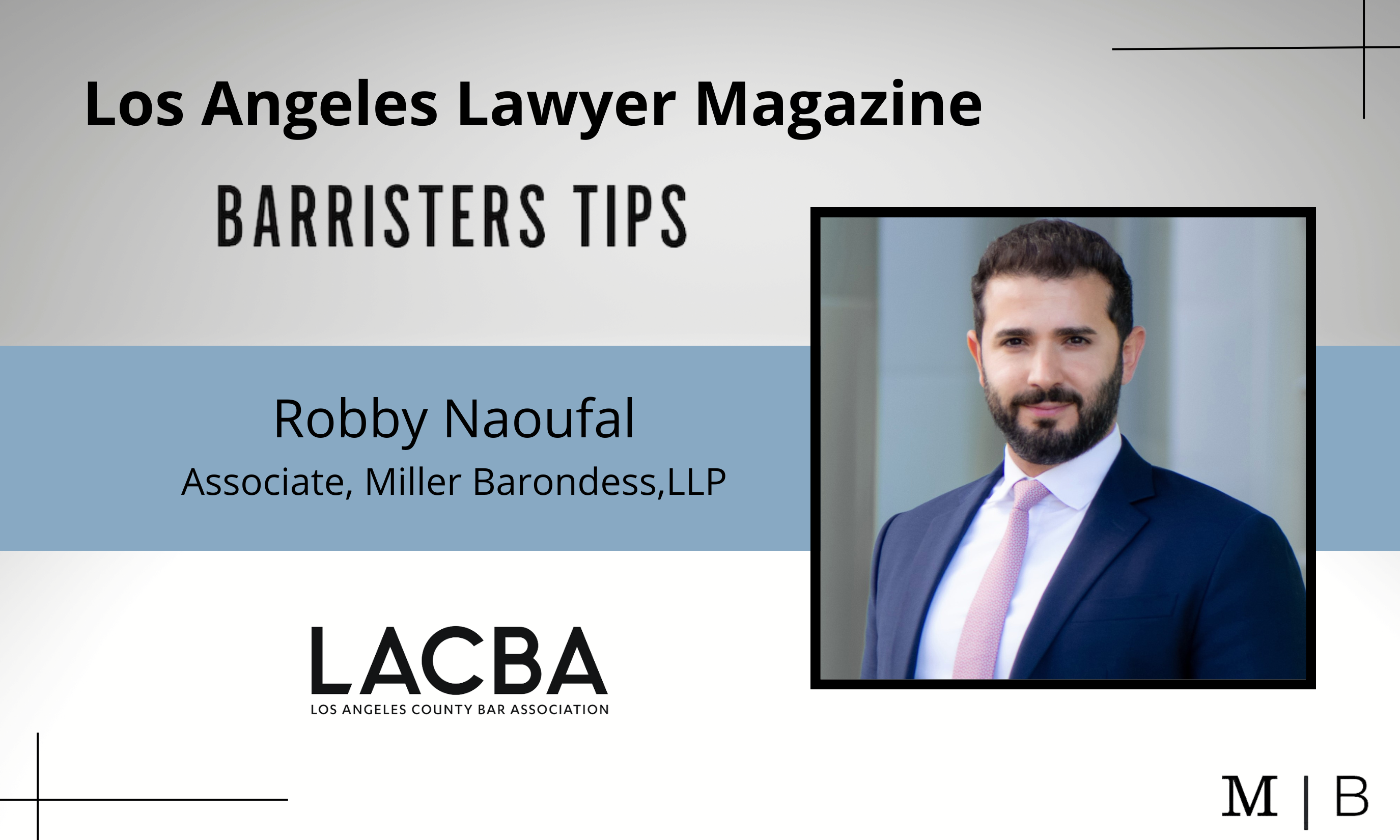An article by Miller Barondess associate Robby Naoufal titled “Barristers Tips” was published in the February 2023 issue of Los Angeles Lawyer Magazine. The article discusses the importance of getting to know your client and their respective industry to help provide better legal advice.
Every client needs to feel confident that his or her counsel knows the law, and mastering the law is itself a tall order. Understanding pleadings, civil procedure, motion practice, discovery, and rules of evidence takes years of study and experience. Nevertheless, any seasoned litigator will insist that knowing the law is not enough. Thoroughly knowing one’s client as well as the industry in which the client works is crucial to giving sound legal advice. Thus, the best tip for any attorney is: “Get to know your client and you’ll give better legal advice for it.”
Clients rarely pursue (or get entangled in) litigation on the basis of personal crusades. The leadership of even a closely held company has a duty to make decisions based on what is best for the business, which typically means what is best for the bottom line. So, each time a new client seeks counsel, that counsel should get to know the client even before diving into those treatises we know so well. This exercise is twofold. First, counsel needs to understand the industry in which the client is working. Second, counsel needs to understand what makes his or her client unique in this field and what success means to the client.
The Industry
Litigation is a uniquely interesting and sophisticated practice because every new dispute presents an opportunity to become a quasi-expert in the field at issue. Knowing the law is undoubtedly a starting point. Yet, in commercial law, for example, understanding the client’s business realities is inescapable; whatever notion of success one may have as an attorney must translate into commercial success for it to have meaningful impact.
While the law is meant to function equitably and predictably, different industries present entirely different value systems and rules. If the client operates in an industry with which counsel is unfamiliar, the attorney must start by reading press coverage from reputable sources. What are the latest government regulations to impact that industry? Which companies are driving the discussion in that space and what have they done to change the field for better or worse? Reviewing high-quality coverage from publications like The Economist, The Atlantic, Wall Street Journal, and others is the most effective path to discover how to speak about and analyze issues topically given the contemporary climate.
Besides press articles, counsel should identify the most prominent industry publications and subscribe to their releases. This will help counsel become versed in industry vocabulary and other jargon that hold valuable insights for a case. This in turn will help counsel to understand how best to relate with the client. Legal jargon is routine with opposing counsel and for court hearings, but winning a case on the facts requires a good handle on the world one’s client inhabits. Knowing the industry well presents a clear edge over the opposition even when in the courtroom. Judges are uniquely exposed to a wide range of industry practice, so showcasing knowledge of how a legal decision may impact the entire industry can help earn even more credibility before the court.
The Client
Mediators hoping to settle disputes often tell clients that there are no winners in litigation. Thus, it will be helpful for counsel as an advocate to know whether this adage is actually true in a particular case. Counsel needs to establish early on what a successful outcome looks like for the client and understand the internal decision-making process required to get there.
Litigation outcomes are often difficult or even impossible to predict with the certainty that clients want. The path to victory, if one is fortunate enough to get there, can be as impactful as the final verdict. Counsel must take time to explore different scenarios that might play out during the course of litigation and determine how receptive the client would be to each.
The appetite for litigation costs—both financial and psychological—can dramatically change a case’s strategy. It is important to be prepared to address these issues early on and chart a path from the outset that identifies the most significant and difficult milestones the client will likely face. The answer to these questions will differ dramatically among clients; a well-established company concerned with maintaining its image will approach a dispute very differently from one whose motto is to move fast and break things. Legal counsel that can guide the client through these difficult issues is better positioned to offer sound advice throughout the entire process.
To effectively represent a client, counsel must fully understand the client. Complex commercial industries are difficult to grasp, and becoming an expert on demand is a major challenge. Counsel needs to spend time between cases following the developments and trends capturing the industries in which clients work. That is where the client’s disputes are born. Counsel must understand that ecosystem before being asked to analyze it, synthesize it, and potentially revolutionize it in order to obtain success.

